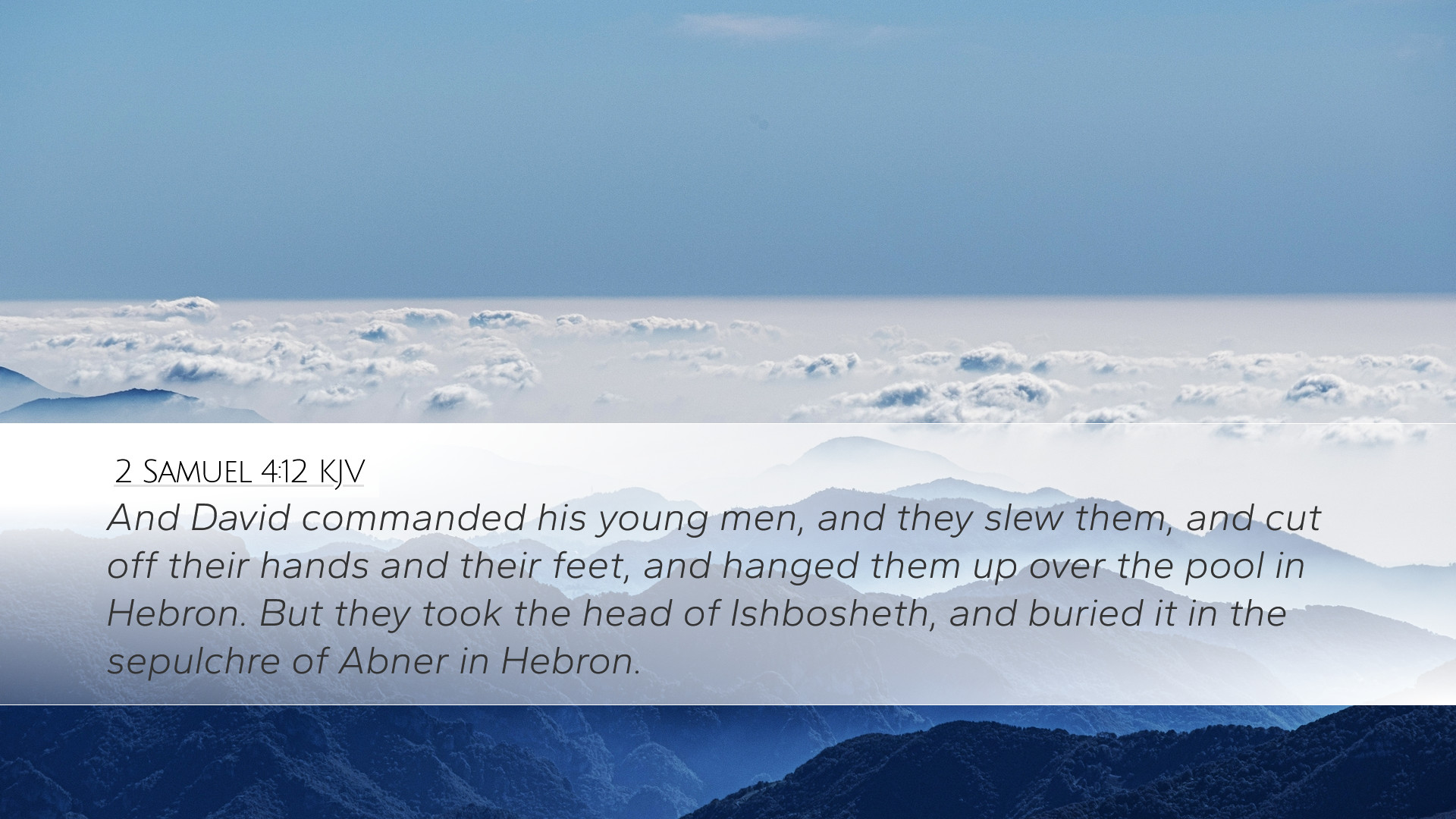Old Testament
Genesis Exodus Leviticus Numbers Deuteronomy Joshua Judges Ruth 1 Samuel 2 Samuel 1 Kings 2 Kings 1 Chronicles 2 Chronicles Ezra Nehemiah Esther Job Psalms Proverbs Ecclesiastes Song of Solomon Isaiah Jeremiah Lamentations Ezekiel Daniel Hosea Joel Amos Obadiah Jonah Micah Nahum Habakkuk Zephaniah Haggai Zechariah Malachi2 Samuel 4:12
2 Samuel 4:12 KJV
And David commanded his young men, and they slew them, and cut off their hands and their feet, and hanged them up over the pool in Hebron. But they took the head of Ishbosheth, and buried it in the sepulchre of Abner in Hebron.
2 Samuel 4:12 Bible Commentary
Commentary on 2 Samuel 4:12
Bible Verse: "And David commanded his young men, and they slew them, and cut off their hands and their feet, and hanged them up over the pool in Hebron. But they took the head of Ish-bosheth, and buried it in the sepulchre of Abner in Hebron."
Introduction
The events surrounding 2 Samuel 4:12 highlight the ruthlessness of political power struggles in ancient Israel and the complexity of David's ascent to the throne. This verse marks a pivotal moment where David seeks to solidify his rule while dealing with the remnants of Saul's house. The actions taken by David’s men underscore the grim realities of warfare and the lengths to which individuals would go to demonstrate loyalty and eliminate threats.
Context of 2 Samuel 4
This chapter recounts the aftermath of King Saul's death and the ensuing rivalry for power. Ish-bosheth, Saul's son, is established as king over Israel, while David is king of Judah. As tensions rise, the narrative focuses on the political maneuvers that ensue, culminating in the assassination of Ish-bosheth by his own captains.
Verse Breakdown
David's Command: "And David commanded his young men..." The deliberation on David's part to execute these men reflects a significant aspect of his leadership. David is portrayed not only as a warrior but also as a ruler who seeks to eliminate threats to his kingship.
- Matthew Henry: He notes that David's actions were sobering and practical, asserting the necessity of eliminating any rivals and displaying decisive leadership in establishing his rule.
- Albert Barnes: Barnes emphasizes that David's command was not merely an act of vengeance but also a statement on justice and the consequences of rebellion against the anointed of God.
- Adam Clarke: Clarke focuses on the significance of this moment as it illustrates the politics of fear and the lengths to which David had to go to secure his position.
The Punishment of the Assassins
The gruesome fate of Ish-bosheth's assassins—having their hands and feet cut off—serves as both a warning and an assertion of David's authority. This punishment is indicative of the violent and brutal context of Ancient Near Eastern politics.
- Matthew Henry: He expresses that this extreme punishment served to show David's contempt for the betrayal and treachery that had characterized Ish-bosheth's rule.
- Albert Barnes: Barnes interprets this as an action that encapsulates the notion of divine justice, implying that treachery would not go unpunished, reflecting on the larger moral implications of the covenant between God and David.
- Adam Clarke: Clarke comments on the symbolic nature of the punishment, suggesting that cutting off hands and feet represents the removal of power and agency from the traitors who sought to take power unlawfully.
Symbolism of Hanging
The act of hanging the bodies up over the pool in Hebron carries significant implications regarding the visibility of justice. It serves a dual purpose: to deter potential usurpers and to solidify David's position as king.
- Matthew Henry: He observes that such actions were common in ancient warfare and were meant to instill fear, demonstrating that David would not tolerate betrayal.
- Albert Barnes: He adds that this display was also a cultural statement of David’s legitimacy as king, reinforcing the idea that the God-ordained leader would not be challenged easily.
- Adam Clarke: Clarke deepens the discussion by noting the importance of public denunciation of treachery in maintaining order within the kingdom, allowing the populace to witness the consequences of disloyalty.
Burying the Head of Ish-bosheth
The decision to bury the head of Ish-bosheth in the sepulcher of Abner signifies an attempt at honoring the fallen king, despite the circumstances of his death. This act reveals the complexities of David's relationship with the house of Saul and offers a glimpse into his understanding of leadership.
- Matthew Henry: Henry suggests that this burial represents a respect for the former king as a sign of David’s ability to rise above personal grievances in establishing his reign.
- Albert Barnes: Barnes views this as an act of political diplomacy, recognizing the need to maintain some semblance of continuity and respect towards Saul’s legacy to stabilize his rule.
- Adam Clarke: Clarke argues that this burial underscores the theological perspective of leadership, where David acknowledges the importance of his predecessors, despite the conflicts involved.
Theological Implications
This passage raises significant theological reflections about justice, divine authority, and the nature of leadership. Leaders are often enshrined in complex moral dilemmas wherein they must balance justice, mercy, and authority.
- Matthew Henry: He reflects on the moral implications of David's choices, suggesting that divine authorization is closely tied to moral decision-making in governance.
- Albert Barnes: Barnes articulates that this narrative highlights the prophetic nature of leadership, where human choices intertwine with divine providence.
- Adam Clarke: Clarke emphasizes the nature of leadership as inherently complex, urging modern leaders to consider more than just political outcomes but also the long-term consequences of their actions in the light of divine principles.
Conclusion
In understanding 2 Samuel 4:12, we glean insights not only into the historical context of David's reign but also draw parallels to contemporary leadership and morality. The ruthless pursuit of power, judgments rendered in political contexts, and the theological implications of these decisions continue to resonate through the ages, providing critical reflections for pastors, students, theologians, and scholars of the Bible. David’s actions serve as a reminder of the moral weight that accompanies leadership and the profound impact of one’s decisions in the unfolding narrative of God’s redemptive history.


